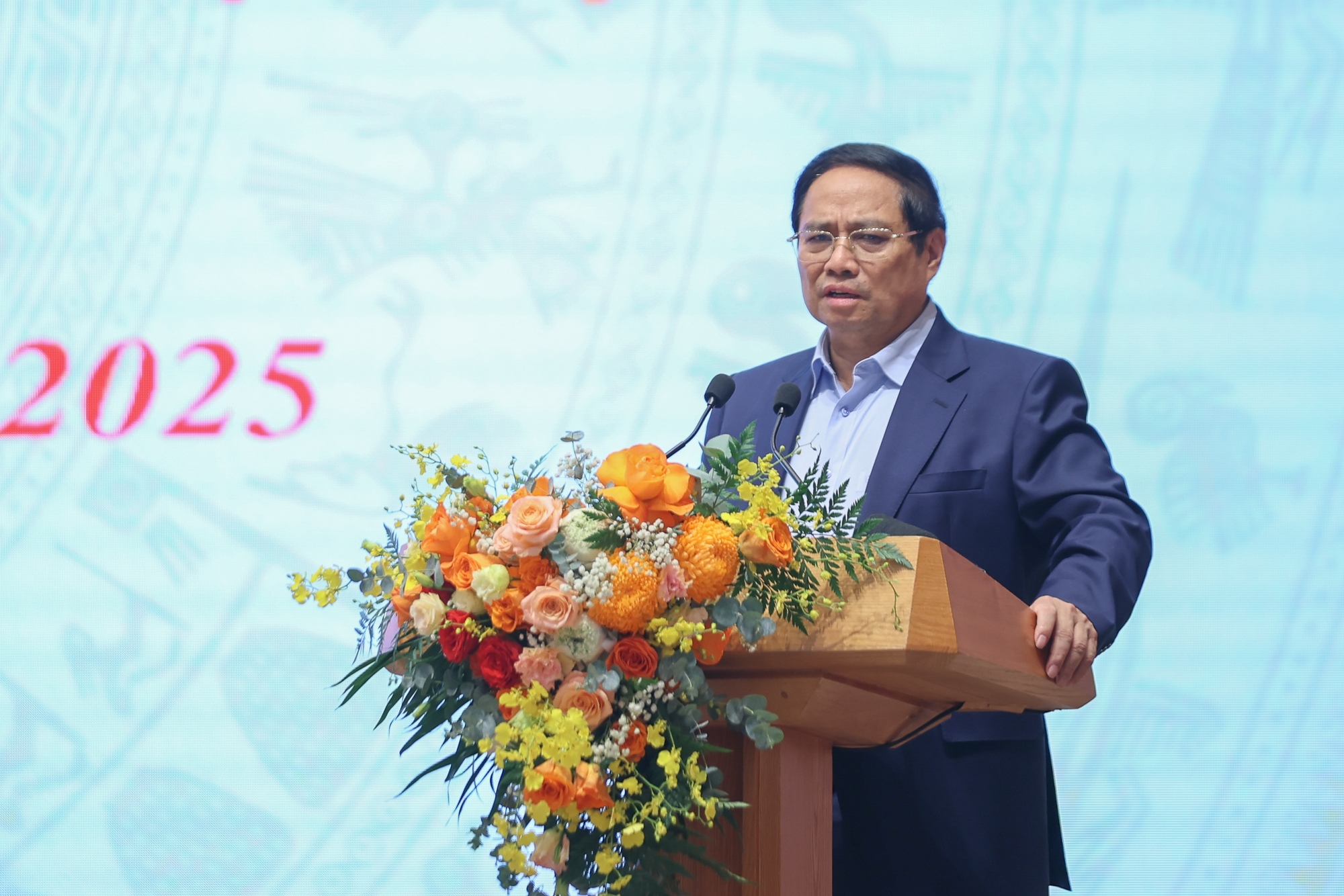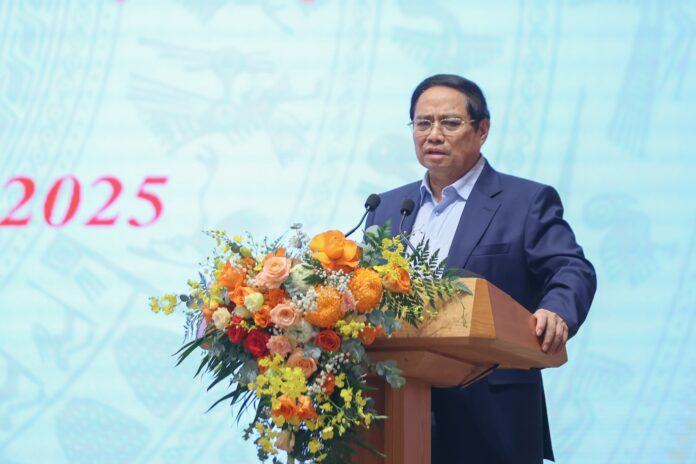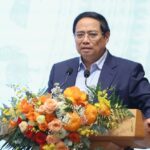
Prime Minister Pham Minh Chinh speaking at the conference – Photo: VGP
|
On the afternoon of June 22, Prime Minister Pham Minh Chinh chaired a mid-term national conference to review the national target programs on new-style rural area building and sustainable poverty reduction, as well as two nationwide campaigns for the 2021-2025 period. The conference was held six months earlier than planned to evaluate the achievements and prepare for the two-level local government model, which will be implemented from July 1, 2025.
In his conclusion, the Prime Minister affirmed the correctness and effectiveness of the early conclusion, especially as the country is entering a new stage of development. He stated that the implementation of Resolution 26-NQ/TW on agriculture, farmers, and rural areas has proven to be correct and suitable, yielding positive results. This process has not only contributed to restructuring the economy in a fast and sustainable manner but has also significantly improved rural infrastructure and enhanced the material and spiritual life of the people. Vietnam has also been recognized internationally as a model for achieving the Millennium Development Goals, especially in poverty reduction, rural development, and clean water provision.
The Prime Minister emphasized that the achievements are the result of the consistent leadership of the Party, directly through the Political Bureau and the Secretariat; the unity and consensus of the entire society; the synchronized participation of the political system; international support; and the internal strength derived from the relationship between agriculture, farmers, and rural areas, combined with Vietnamese culture, natural conditions, and people.
Regarding the orientation for the next phase, the Prime Minister affirmed that the overarching goal is to build an ecological agriculture, a modern rural area, and a civilized farmer, in line with the country’s orientation in the new era as set out in the Resolution of the 13th National Party Congress. At the same time, the poverty reduction program will continue to be implemented in a comprehensive, inclusive, and sustainable manner.
The Prime Minister requested that the entire political system focus on four key groups of solutions:
First, improve the institution to establish the central role of farmers, considering agriculture as the driving force and rural areas as the foundation for development;
Second, develop strategic infrastructure serving rural areas in a modern direction, including transportation, energy, health care, education, culture, and digital infrastructure;
Third, build human resources and a contingent of farmers with qualifications and capabilities suitable for the new context, in line with the two-level government model, while associating with the national digital transformation strategy, integration, legal innovation, and private economic development;
Fourth, diversify agricultural products, supply chains, and markets, targeting domestic and international consumption. The Prime Minister particularly drew attention to the potential of the Halal food market, which serves over two billion consumers worldwide.
Additionally, farmers are expected to take a proactive and pioneering role in three aspects: escaping poverty and getting rich from their internal resources, building the image of a civilized farmer, and engaging in green production and digital transformation. The Prime Minister especially emphasized the role of the “digital literacy campaign,” aiming to universalize digital skills to build a digital economy, digital society, and digital citizens in rural areas.
Regarding the organization of implementation, the Prime Minister directed ministries, sectors, and localities to promptly build national target programs for the 2026-2035 period in an integrated manner. At the same time, launch appropriate emulation campaigns, with clear assignments of people, tasks, time, responsibilities, products, and authority to ensure effectiveness in implementation. In the current context, the state continues to play the role of “seed capital” to lead and activate social resources, encourage public-private cooperation, and improve institutions to mobilize internal resources, develop infrastructure, and ensure social welfare.
The Prime Minister requested that the implementation of the programs and campaigns be substantive and avoid formalism. There should be control tools to prevent negativity, wastefulness, and corruption in the process. The press and media are requested to actively participate by providing full and accurate information, contributing to spreading the programs to every citizen.
Concluding the conference, the Prime Minister emphasized the core principle: “The policy must be right, consensus must be high, implementation must be effective, and the benefits to the people must be substantial.” People should perceive the results brought about by the programs, not just through slogans or commitments, but through specific and measurable changes in their daily lives.
– 05:13 23/06/2025
“Accelerating Rural Transformation: The Four Key Drivers”
After over a decade of implementation, the rural development program has achieved remarkable results: 79% of communes meet the new rural criteria, 51% of districts have completed their missions, and 12 provinces and cities have been recognized for accomplishing their new rural construction goals.
“Market Volatility: BSR’s Opportunity to Accelerate”
The global oil market in the first half of 2025 remained volatile due to escalating geopolitical tensions, particularly the armed conflict between Iran and Israel, which disrupted supply chains, caused supply disruptions, and led to erratic price movements in Brent crude oil. In Vietnam, oil refineries, including the Dung Quat Refinery operated by Binh Son Refining and Petrochemical Company Limited (BSR), faced a double challenge of cheap import competitors and fuel price instability.
A Business Offers Free E-Invoicing Software for Small Businesses: Claim it Now!
“Small businesses will be thrilled to discover that they are eligible for a complete waiver of fees for a range of essential software tools. This includes electronic invoicing software initiated from cash registers, remote digital signatures, accounting software, and retail management software. These tools are invaluable assets for any small business, offering streamlined efficiency and effective management solutions.”
Great Opportunities for Patient Investors Holding onto Nhon Trach (Dong Nai) Land
Although not officially merged with Ho Chi Minh City, Nhon Trach in Dong Nai province has maintained stable growth in the real estate market over time. Its strategic “gateway” location, offering direct trade links to both Ho Chi Minh City and Ba Ria-Vung Tau, coupled with continuous advancements in transportation infrastructure, has kept the area thriving.














































